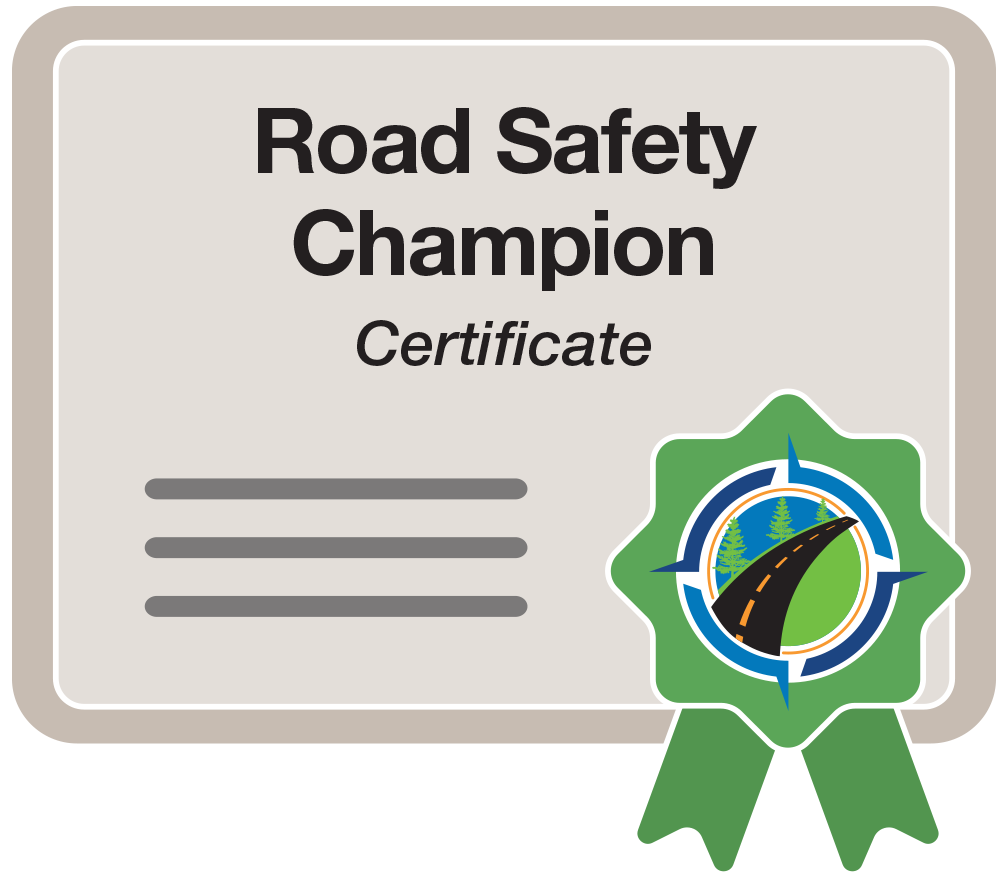Road Safety Champion Program
Become a Road Safety Champion!
The Road Safety Champion Program (RSCP) is a nationally recognized certificate program designed to build a knowledgeable, safety minded workforce, responsible for operating, maintaining, and designing local roads. Road Safety Champions prioritize safety and are motivated to implement safety improvements that reduce fatalities and serious injuries on rural and local roadways.
Training participants will complete a series of courses in core and specialized safety issues. When all requirements are met, participants will be awarded a Road Safety Champion Program Certificate. (Note: the certificate is not a degree or professional certification.)
Take All Seven Core Modules* + Choose One of the Four Pathways* = Your Road Safety Champion Certificate!
*Courses may be taken in any order
Core Modules
- CM#1 – Introduction to Road Safety
- CM#2 – Understanding Human Factors
- CM#3 – Introduction to Traffic Safety
- CM#4 – Overview of the MUTCD
- CM#5 – Intersection of Transportation of Public Health and Law Enforcement
- CM#6 – Reading the Roadway
- CM#7 – Safety Analysis Process
Maintenance & Construction
- M&C#1 – Maintaining a Safer Roadway
- M&C#2 – Work Zones
- M&C#3 – Worker Safety
- M&C#4 – Traffic Incident Management
- M&C#5 – Take Action Now – Maintaining Safety
- M&C#6 – OSHA 10
- M&C#7 – Flagger Certification
Public
Health
- PH#1 – Public Health Approaches to Road Safety
- PH#2 – Under Development
Planning &
Engineering
- P&E#1 – Countermeasures for Road Safety
- P&E#2 – Work Zones
- P&E#3 – Overview of Local Road Safety Plans
- P&E#4 – Overview of Data and Tools for Safety
- P&E#5 – Crash Reporting
- P&E#6 – Systemic Safety Projection Selection Tool
First
Responder
- FR#1 – Traffic Incident Management
- FR#2 – Crash Reporting
- FR#3 – Under Development

The RSCP is a “Roadway Safety 101” course made up of core modules and career focused pathways for staff in transportation, public health, and first responder agencies who have an interest in roadway safety but are not safety experts.
Are you a Local or Tribal Technical Assistance Program Centers (LTAPs/TTAPs) trainer or a not-for-profit organization providing professional development and want to administer all or part of the RSCP? Find out how here.
If you have questions, reach out to us directly at info@safetycenter.org.
We will be delivering the Maintenance & Construction and Planning & Engineering Pathway modules on Tuesdays from 11 am – 1 pm ET starting January 16, 2023 (note that some will be given out of order due to trainer availability). Registration is now open on our training page >
Course Details
Core Modules
RSCP: Introduction to Road Safety (CM#1)
Description: This two-hour training provides an overview of safety trends, an understanding of the national safety vision, and discusses techniques for safety collaboration. It will also discuss the importance of prioritizing safety and how an individual can become a Road Safety Champion.
RSCP: Understanding Human Factors (CM#2)
Description: This two-hour training will provide an overview of human factors principles. It will allow the non-expert in human factors to more effectively bring consideration of the road user’s capabilities and limitations into policies and practices. Knowing how road users interact with their vehicle, the roadway and other road users can also provide useful insights. Armed with that knowledge, construction and maintenance personnel, planners, engineers, public health professionals and law enforcement can work together to target appropriate countermeasures to help reduce injury crashes.
RSCP: Introduction to Traffic Safety Culture (CM#3)
Description: This training introduces growing positive traffic safety culture to significantly improve road safety in America. Participants will leave the training with a better understanding of the elements that shape traffic safety culture, how those factors interact to affect behaviors related to traffic safety, strategies that can be implemented to improve traffic safety culture among various groups, and ideas about how they can leverage their role (and the role of others) in growing a positive traffic safety culture.
RSCP: Overview of the MUTCD (CM#4)
Description: This module is an introduction and overview of the Manual on Uniform Traffic Control Devices (MUTCD). The MUTCD defines the standards by which traffic signs, road surface markings, and signals are designed, installed, and used on all public streets, highways, bikeways, and private roads open to public traffic. This module will help participants become aware of the need for uniformity of traffic control devices. Emphasis will be given to an understanding of the MUTCD, Traffic Control Devices, and Temporary Traffic Control.
RSCP: Intersection of Transportation with Public Health and Law Enforcement (CM#5)
Description: This two-hour training will discuss the need for transportation, public health and law enforcement agencies to work together on the road to zero and strategies to achieve this.
RSCP: Reading the Roadway (CM#6)
Description: This two-hour training will teach participants how to “read the road” as well as the importance of doing so in daily activities. It will use real world examples on different roadway components to demonstrate how participants may be able to uncover potential safety issues during their routine activities. It will also discuss how the road safety audit process can be used to “read the road” in a more formal approach. The training will also discuss the consequences daily activities of workers may have on safety.
RSCP: Safety Analysis Process (CM#7)
Description: The safety analysis process, as part of the FHWA Safety Toolkit, is a systematic process for identifying the factors that can contribute to crashes and implementing effective countermeasures. It is a best practice method that is flexible and can be used to fit your needs. This two-hour training will cover the safety analysis process and discuss how it can be applied using two different complementary analysis methods: the traditional site analysis and the systemic analysis. Additionally, case studies will be utilized to demonstrate practical applications of the process.
Maintenance & Construction
RSCP: Maintaining a Safer Roadway (M&C#1)
Description: Local agency maintenance forces are in the best position to be the “eyes and ears” of the road when it comes to identifying safety issues. This two-hour training will focus on maintenance safety solutions that local maintenance forces can implement on a daily basis to address safety issues related to elements such as shoulder drop-offs, right-of-way obstructions, striping and signing, guardrails, mowing, sweeping, patching, drainage, winter maintenance, etc. It will include a hands-on case study. It will also discuss a process that can be utilized to improve safety through policy and procedure changes.
RSCP: Work Zones (M&C#2)
Description: This two-hour training provides an overview of roadway work zones on rural roads and the minimum standards for various types of work zones covered in the Manual on Uniform Traffic Control Devices (MUTCD)
RSCP: Worker Safety (M&C#3)
Description: This two-hour training provides an overview of potential hazards for workers and explores preventive measures for improving worker safety.
RSCP: Traffic Incident Management (M&C#4): We do not offer this course (Offered elsewhere)
For this requirement, please submit a certificate of completion to the National Center for Rural Road Safety through email at info@ruralsafetycenter.org. Some options for taking this course include:
- National Highway Institute’s National Traffic Incident Management Responder Training (Web-based)
- Responder Safety Learning Network’s National TIM Training Certificate (Online – self-paced)
RSCP: Take Action Now – Maintaining Safety (M&C#5)
Description: This two-hour training will focus on maintenance safety solutions construction and maintenance personnel can implement on a daily basis. It will focus on safety issues related to signs and supports, vegetation control and drainage features, using the FHWA documents: Vegetation Control for Safety, A Guide for Local Highway and Street Maintenance Personnel, Maintenance of Drainage Features for Safety, A Guide for Local Street and Highway Maintenance Personnel and Maintenance of Signs and Sign Supports: A Guide for Local Roads Maintenance Personnel as the basis.
RSCP: OSHA 10 (M&C#6): We do not offer this course (Offered elsewhere)
For this requirement, please submit a certificate of completion to the National Center for Rural Road Safety through email at info@ruralsafetycenter.org. Some options for taking this course include your state Department of Transportation or your Local Technical Assistance Program (LTAP). To find your LTAP, click here.
RSCP: Flagger Certification (M&C#7): We do not offer this course (Offered elsewhere)
For this requirement, please submit a certificate of completion to the National Center for Rural Road Safety through email at info@ruralsafetycenter.org. Some options for taking this course include your state Department of Transportation or your Local Technical Assistance Program (LTAP). To find your LTAP, click here.
Planning and Engineering
RSCP: Countermeasures for Road Safety (P&E#1)
Description: Road safety countermeasures are actions taken to improve transportation safety and therefore decrease the number of injuries and fatalities. These countermeasures can consist of infrastructure, behavioral, or programmatic/policy implementation. This two-hour training will provide an overview of safety countermeasures applicable to local roads with an emphasis on low-cost practices. Discussions include Crash Modification Factors (CMFs), systemic safety analysis, and factors for evaluating and selecting countermeasures.
RSCP: Work Zones (P&E#2)
Description: This two-hour training provides an overview of roadway work zones on rural roads and the minimum standards for various types of work zones covered in the Manual on Uniform Traffic Control Devices (MUTCD)
RSCP: Overview of Local Road Safety Plans (P&E#3)
Description: Local road practitioners across the country play a critical role in addressing crash risks at the local level and may be able to identify the specific or unique conditions that contribute to crashes within their jurisdiction. The Local Road Safety Plan (LRSP) offers a foundation for consensus and focus and helps communities take a proactive stance in reducing and preventing local road fatalities and injuries. This two-hour training will provide an overview of an LRSP including how they support safety efforts, the steps to develop an LRSP, and the strategies for implementing an LRSP.
RSCP: Overview of Data and Tools for Safety (P&E#4)
Description: Data-driven approaches to traffic safety are critical to reducing motor vehicle traffic fatalities and serious injuries. Traffic safety data may be used to evaluate performance, inform decisions, and allocate resources, among many other uses. In this two-hour training, learn about the different types of data, data challenges for local agencies, and the various tools available for network screening. Discussions include Highway Safety Manual, usRAP, Road Safety Audits, Systemic Safety Project Selection Tool, and Crash Tree Maker.
RSCP: Crash Reporting (P&E#5)
Description: This two-hour training provides an overview of the role of crash data collection and reporting in fostering a Safe System and how such reporting benefits from cross-sectoral coordination among law enforcement, engineers, planners, and public health professionals. This training also reviews challenges with crash and injury surveillance, some nuances of crash data collection and reporting, as well as ways in which crash and injury data can be leveraged to inform the design of safety interventions.
RSCP: Systemic Safety Project Selection Tool (P&E#6)
Description: The safety analysis process, as part of the FHWA Safety Toolkit, is a systematic process for identifying the factors that can contribute to crashes and implementing effective countermeasures. It is a best practice method that is flexible and can be used to fit your needs. This two hour training will cover the seven step process and discuss how it can be applied using two different complementary analysis methods: the traditional site safety analysis and the systemic analysis. Additionally, case studies will be utilized to practice applying the process.


